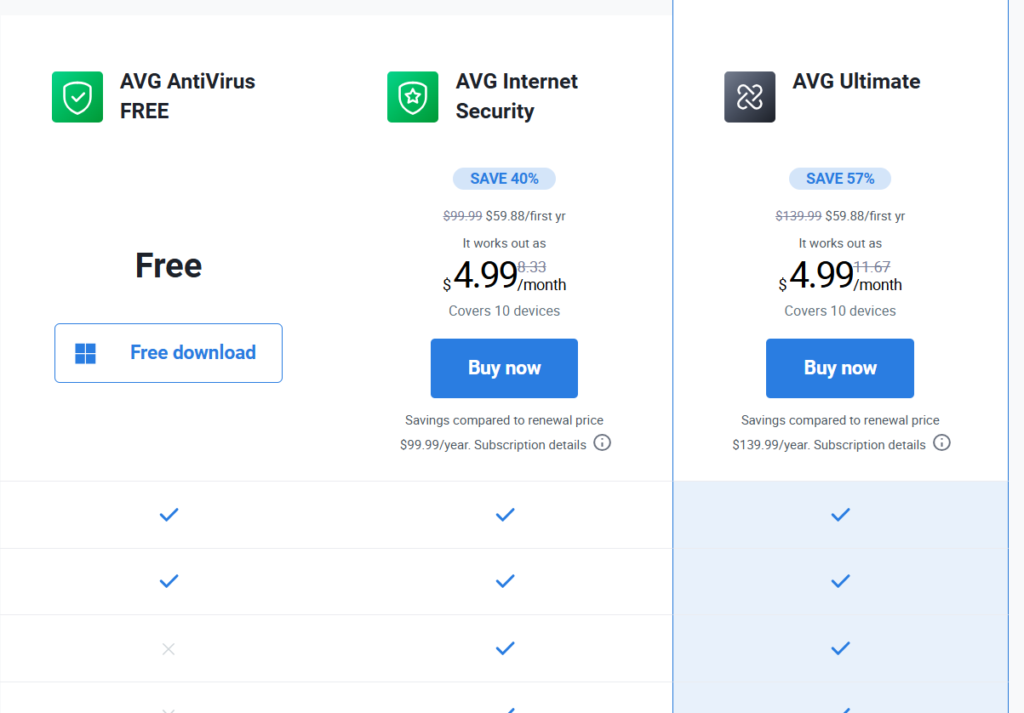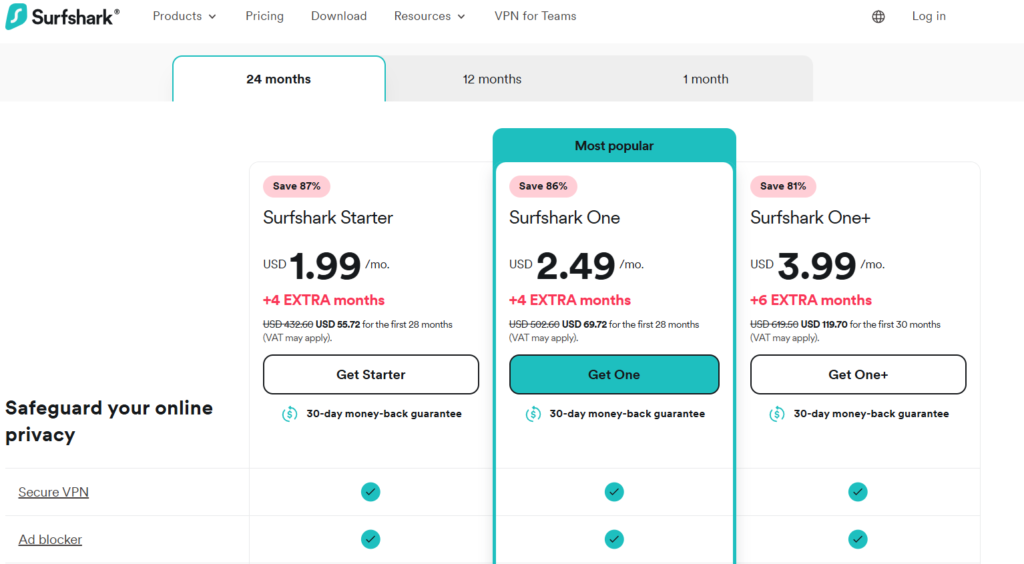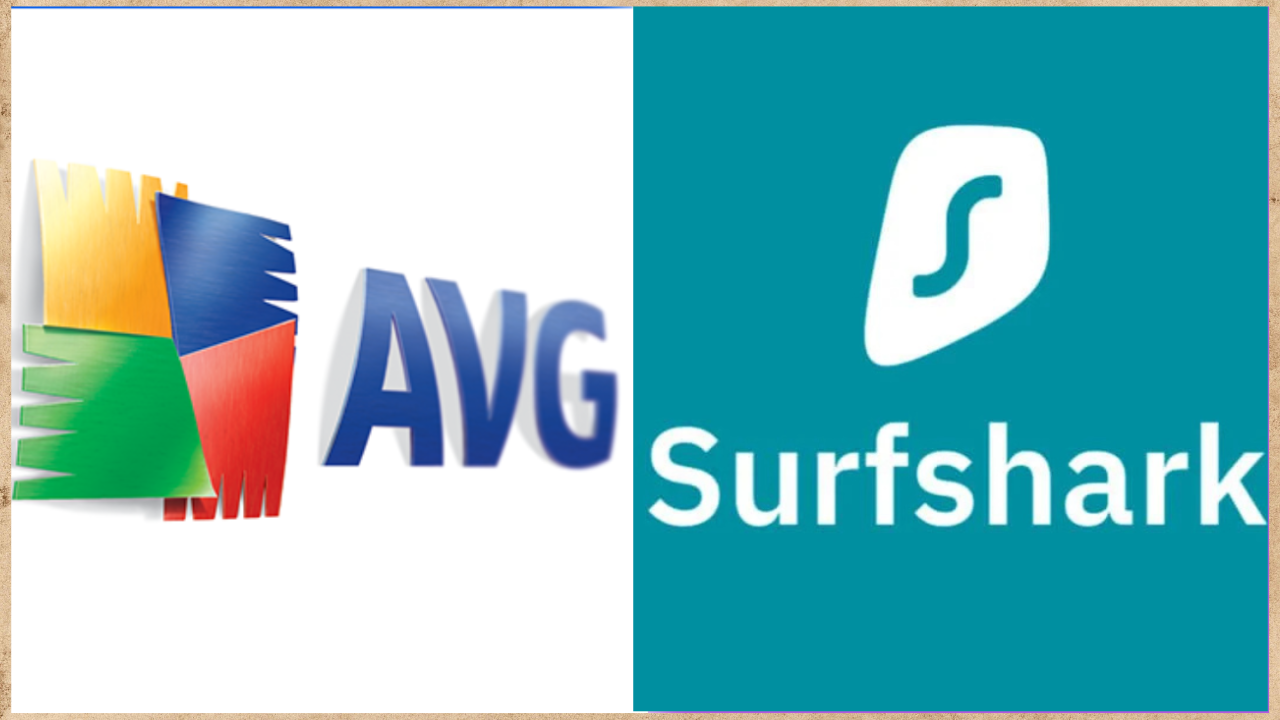AVG vs Surfshark: A Comprehensive Comparison of Antivirus and VPN Solutions
In the evolving digital landscape, online security and privacy have become crucial concerns for individuals and organizations alike. As cyber threats continue to escalate, the demand for reliable tools to protect sensitive data and maintain anonymity online is increasing. This has led to a surge in cybersecurity solutions, among which AVG vs Surfshark stand out as popular choices. In this article, we will delve deep into the comparison of these two prominent players, providing insights on their features, performance metrics, user experiences, and overall effectiveness. With the aim of helping consumers navigate the complexities of AVG vs Surfshark, this comprehensive analysis aims to empower users to make informed decisions about their online security needs.
Table of Contents
Introduction: AVG vs Surfshark Overview
As technology advances, the range of online threats grows exponentially, making it imperative for users to equip themselves with effective security measures. AVG vs Surfshark are both highly regarded within their respective domains, offering distinct approaches to tackling the issue of cybersecurity.
AVG was introduced as an antivirus software solution, focusing predominantly on defending devices against malware, viruses, ransomware, and phishing attacks. It has built a reputation over decades as a formidable player in endpoint protection, boasting a vast array of features designed to safeguard digital environments.
Surfshark, in contrast, emerged as a Virtual Private Network (VPN) provider with a strong emphasis on privacy and anonymity. Its core functionality revolves around encrypting internet traffic and masking users’ IP addresses. While Surfshark does offer some security features, its main objective is to provide users with the ability to surf the web safely and access content without geographical limitations.

AVG’s Foundation in Antivirus Protection
AVG’s roots are firmly grounded in traditional antivirus mechanisms. Its extensive toolkit includes real-time scanning, cloud-based threat intelligence, and behavioral analysis to thwart potential dangers that lurk in the digital realm. The company’s experience in this field allows it to maintain a consistent track record of effective malware detection and removal.
The suite of features offered by AVG caters to a range of user needs, from basic virus protection for individual users to comprehensive internet security solutions for businesses. Features such as firewall protection, anti-phishing capabilities, and identity theft monitoring further extend AVG’s protective umbrella, making it an appealing choice for those looking for all-encompassing security.
Surfshark’s Focus on Privacy and Anonymity
Surfshark takes a different route by prioritizing online privacy as its primary function. By utilizing robust encryption protocols, including AES-256-GCM, Surfshark ensures that users’ data travels securely across the internet. The VPN service operates a wide network of servers across various countries, allowing users to mask their digital identities effectively.
This focus on privacy enables users to bypass regional restrictions and access geo-blocked content seamlessly. Amidst growing concerns about surveillance and data harvesting, Surfshark’s commitment to a strict no-logs policy assures users that their browsing habits remain confidential.
Product Type and Purpose AVG vs Surfshark
When evaluating AVG vs Surfshark, it’s vital to consider the distinct product types and purposes that each serves. Understanding the primary mission of each tool can guide users toward selecting the right solution for their specific online security needs.
AVG as an Antivirus Solution
AVG functions primarily as an antivirus and internet security suite. Its design centers on protecting devices from a variety of threats, ranging from commonplace viruses to sophisticated malware. This essential purpose shapes the features AVG offers, with a strong focus on detecting, preventing, and mitigating risks.
Users looking for a robust security solution will find AVG equipped with essential tools to shield their devices effectively. The combination of real-time scanning and advanced threat detection means that AVG remains vigilant against known and emerging threats, thus fostering the peace of mind users seek in a comprehensive antivirus program.
Surfshark as a VPN Provider
In stark contrast, Surfshark serves as a VPN designed to enhance online privacy and provide unrestricted access to the internet. Its fundamental purpose revolves around creating secure tunnels for internet traffic, thereby safeguarding users’ data and enabling them to browse anonymously.
For those who prioritize internet freedom and privacy, Surfshark offers a compelling solution. By allowing users to connect through a multitude of servers globally, Surfshark empowers individuals to bypass censorship, access streaming services from different regions, and protect their data from prying eyes.
Complementary Roles in Digital Security
Although AVG vs Surfshark operate in different realms of cybersecurity, they can be viewed as complementary tools. Many users may benefit from utilizing both AVG’s antivirus features and Surfshark’s VPN capabilities to create a comprehensive defense against online threats. This dual approach fosters a multilayered security strategy, ensuring that users are protected from malware while simultaneously maintaining their privacy during internet usage.
Key Features Comparison AVG vs Surfshark
Comparing the key features of AVG vs Surfshark reveals crucial differences that impact their overall value and utility. Each solution boasts unique offerings tailored to address its specific audience’s needs.
Antivirus Protection in AVG
AVG excels in traditional antivirus protection, providing users with a range of security features to combat malware and other threats. Real-time scanning keeps devices safe by continuously monitoring files and applications for any signs of malicious behavior. Additionally, AVG employs cloud-based analysis to detect and block emerging threats as they arise.
The inclusion of features like anti-phishing protection enhances AVG’s capabilities, ensuring that users remain safeguarded against deceptive websites trying to steal personal information. Moreover, AVG incorporates identity theft protection that notifies users if their personal details appear in data breaches, alerting them to potential risks.
Security Features in Surfshark
While Surfshark is primarily a VPN service, it includes several security features that enhance the overall user experience. The built-in ad-blocker removes intrusive advertisements that could lead to harmful websites, streamlining the browsing experience. Additionally, Surfshark provides a tracker blocker that prevents websites from collecting tracking cookies, further reinforcing user privacy.
Another notable aspect of Surfshark is its CleanWeb feature, which actively blocks malware and phishing attempts during web browsing sessions. Although these security features may not rival those of dedicated antivirus solutions, they complement Surfshark’s core functionality by enhancing user safety when connected to the VPN.
Unique Offerings: Password Manager and Parental Controls
AVG stands out with additional features like a password manager and parental controls. The password manager assists users in securely storing and generating complex passwords for their accounts, reducing the risk of unauthorized access. Meanwhile, parental controls allow users to restrict access to inappropriate content, making AVG an attractive option for families concerned about online safety.
On the other hand, Surfshark focuses narrowly on its VPN capabilities, foregoing many of the additional features common to traditional security suites. This approach allows Surfshark to streamline its services, placing the utmost importance on privacy and speed without the distractions of supplementary functionalities.
Security and Privacy Protection AVG vs Surfshark
A primary consideration when choosing between AVG vs Surfshark lies in the level of security and privacy protection each solution offers. Both have strengths in different areas, shaping how users perceive their online defenses.

AVG’s Multi-Layered Security Approach
AVG employs a multi-layered approach to security, combining various technologies to create a comprehensive defense against threats. The continuous real-time scanning coupled with behavioral analysis helps to identify suspicious activities and mitigate risks before they escalate into full-blown attacks.
Furthermore, AVG’s use of cloud-based threat intelligence means that users benefit from collective knowledge about threats affecting other users. This shared information can lead to faster updates and improved detection capabilities, offering users peace of mind as they navigate the digital world.
Surfshark’s Commitment to Online Privacy
Surfshark thrives on its commitment to privacy, ensuring that users can browse the internet without fear of being monitored. Utilizing strong encryption protocols, Surfshark protects user data from interception by third parties during transmission. This level of encryption becomes especially critical when accessing public Wi-Fi networks, where vulnerabilities abound.
Moreover, Surfshark’s no-logs policy serves as a foundational principle of its privacy commitment. Users can rest assured that their connection data and browsing history are not stored or tracked, reinforcing the trustworthiness of the service. Such assurances resonate strongly with users seeking anonymity and confidentiality.
Bypassing Geo-Restrictions and Censorship
In addition to its core security functions, Surfshark excels at bypassing geo-restrictions imposed by content providers. By connecting to servers located in different countries, users can access region-locked content effortlessly. This capacity is particularly advantageous for those wishing to access streaming platforms, social media, or other websites that may be restricted based on geographic location.
AVG, while providing robust security features, does not offer the same level of flexibility regarding content access. Thus, users requiring both security and the ability to access global content may find that combining AVG vs Surfshark creates a more satisfying experience.
Performance and Speed AVG vs Surfshark
When considering AVG vs Surfshark, evaluating their performance and speed capabilities is essential. A solution that slows down your system or internet connectivity may hinder productivity and prompt frustration. Here, we assess how each performs under different circumstances.
AVG’s System Impact
AVG is known for its relatively low impact on system performance during routine operations. The software’s lighter resource consumption during regular scans allows users to conduct everyday tasks without noticeable slowdowns. However, full system scans can consume more resources, occasionally leading to reduced performance temporarily.
Many users appreciate AVG’s balance of thorough scanning capabilities combined with minimal interference in daily computing tasks. For those focused on maintaining device performance while ensuring security, AVG proves to be a solid choice.
Surfshark’s Connection Speeds
Surfshark generally maintains good performance levels, particularly when connected to servers located nearby. The ease of connecting to local servers often results in minimal latency and impressive speeds, allowing for seamless browsing, streaming, and gaming experiences.
Conversely, users connecting to distant servers may encounter noticeable speed reductions inherent in VPN technology. The encryption process involved in securing data can introduce overhead that slightly impedes performance. Nonetheless, many users find that the benefits of enhanced privacy far outweigh any minor inconveniences associated with slower speeds.
User Experience and Expectations
Ultimately, the user experience surrounding performance expectations varies from person to person. Some users using AVG may prioritize effective malware protection over minimal resource consumption, willing to endure occasional slowdowns during scans. Similarly, Surfshark users often recognize that connecting to remote servers may cause slight delays but accept this trade-off for the enhanced online privacy and unrestricted content access.
User Interface and Experience AVG vs Surfshark
The user interface plays a significant role in determining how effectively users can navigate and utilize a software application. A clear, organized, and intuitive interface enhances the overall experience, reducing frustration and fostering engagement with the features provided.
AVG’s Simple Navigation
AVG offers a straightforward interface that appeals to users of all technical skill levels. The organization of its features allows users to access necessary tools quickly, facilitating a seamless experience. Clear instructions guide users in navigating settings and configurations, ensuring that even less tech-savvy individuals feel comfortable managing their security options.
One notable aspect of AVG’s interface is its dashboard. Users can easily view their protection status, perform scans, and access additional features from a single location. This centralization simplifies the user experience and encourages users to maximize the available security tools.
Surfshark’s Sleek Design
In comparison, Surfshark showcases a clean and modern interface that emphasizes usability. The VPN client makes it easy for users to connect to different servers and manage their settings with just a few clicks. The absence of clutter and well-structured menus contribute to a pleasant user experience, allowing users to focus on what matters most—safeguarding their online presence.
The simplicity of Surfshark’s interface is particularly enticing for new users unfamiliar with VPN technology. With features clearly labeled and accessible, users can effortlessly navigate the platform, enhancing their confidence in using the service effectively.
Cross-Platform Consistency
Both AVG vs Surfshark ensure a consistent experience across multiple platforms, including Windows, macOS, iOS, and Android. This compatibility fosters accessibility for users with diverse device ecosystems, allowing them to implement security measures seamlessly regardless of their chosen operating system.
By providing a cohesive experience across devices, both AVG vs Surfshark instill confidence in users, assuring them that they can manage their online security without cumbersome transitions between platforms.
Compatibility and Device Support AVG vs Surfshark
The breadth of compatibility and device support is a critical factor that influences users’ decisions when selecting security solutions. Understanding how well AVG vs Surfshark accommodate various devices can illuminate which service aligns best with individual requirements.
AVG’s Wide Device Compatibility
AVG supports a diverse array of devices, including Windows, macOS, Android, iOS, and Chromebooks. This broad compatibility allows users to secure multiple devices within their household or organization without restrictions. Furthermore, AVG extends device support through browser extensions for popular browsers like Chrome, Firefox, and Edge.
For users with mixed device ecosystems or those seeking to protect family members’ devices, AVG’s extensive compatibility presents a viable solution. Families can rely on AVG’s security suite to provide comprehensive protection across every member’s devices.
Surfshark’s Unlimited Device Connections
Surfshark takes device support a step further by permitting unlimited simultaneous connections with a single subscription. This flexibility makes it an exceptional choice for families, small businesses, or users with numerous personal devices. While AVG may limit connections based on subscription plans, Surfshark eliminates concerns about reaching a maximum device threshold.
In terms of compatibility, Surfshark covers major platforms, including Windows, macOS, iOS, Android, and Linux. Moreover, it can also be configured on routers, expanding the coverage to other smart devices that may not natively support VPN applications.
Choosing Based on Use Cases
When considering compatibility and device support, users must evaluate their specific needs. If protecting multiple devices simultaneously is a priority, Surfshark’s unlimited connections present a compelling argument. However, if users require dedicated antivirus protection for varied devices, AVG’s wide compatibility may better suit their needs.
Pricing Plans and Value for Money AVG vs Surfshark
Evaluating the pricing plans offered by AVG and Surfshark sheds light on the overall value derived from each service. Cost considerations play a critical role in decision-making, impacting users’ willingness to invest in cybersecurity solutions.
AVG’s Subscription Options
AVG presents a range of subscription options tailored to various user needs. Individuals can choose from basic antivirus protection to more comprehensive internet security packages, each varying in price based on included features. AVG frequently promotes discounts for new users, making it a relatively affordable choice for those seeking reliable virus protection.
The tiered pricing structure allows users to select a plan aligning with their specific requirements while remaining mindful of budget constraints. While AVG tends to be cost-effective for those needing antivirus capabilities, users requiring both antivirus and VPN services should note the added expense of purchasing AVG’s separate VPN product.

Surfshark’s Competitive Pricing Model
Surfshark employs a tiered subscription model that offers varying durations at competitive rates. The standout feature of Surfshark’s pricing is the allowance for unlimited simultaneous connections, representing significant value for larger households or businesses. This unique offering distinguishes it from competitors that limit device connections per subscription.
Additionally, Surfshark often runs promotions and discounts, enhancing its appeal among cost-conscious consumers. When considering its pricing in relation to the extensive features provided, many users deem Surfshark a cost-effective option for achieving greater online privacy and access.

Evaluating Overall Value
Ultimately, evaluating the overall value for money will depend on individual needs and preferences. Users primarily focused on robust antivirus protection may gravitate toward AVG’s offerings, while those prioritizing online privacy and the ability to bypass geo-restrictions might find better value in Surfshark’s subscription model.
Customer Support and Resources AVG vs Surfshark
Customer support plays a pivotal role in the user experience, especially when issues arise or assistance is needed. Evaluating the support offerings of AVG vs Surfshark highlights distinctions that may influence user satisfaction.
AVG’s Support Channels
AVG provides customer support through email and chat, although response times can vary depending on volume. While AVG also features a detailed knowledge base with articles and troubleshooting guides, users may find that live support responses can be inconsistent.
For individuals seeking immediate assistance, the lack of 24/7 support may pose a challenge. Nevertheless, the resources found within AVG’s knowledge base can be valuable for users willing to troubleshoot common problems independently.
Surfshark’s 24/7 Live Chat Support
In contrast, Surfshark offers 24/7 live chat support, ensuring users can access immediate assistance whenever needed. This level of responsiveness often proves beneficial, as users can receive timely help when facing difficulties with their VPN connection or related inquiries.
Additionally, Surfshark maintains a comprehensive FAQ section and an extensive collection of tutorials and troubleshooting resources. The combination of live support and self-help materials contributes to a positive user experience, instilling confidence in Surfshark’s dedication to customer care.
The Importance of Support Resources
For users contemplating which service to choose, understanding support channels and resources can significantly impact overall satisfaction. Those who prioritize hands-on assistance may prefer Surfshark’s responsive live chat option, while users comfortable with independent research may find sufficient support through AVG’s knowledge base.
User Reviews and Reputation AVG vs Surfshark
User reviews and overall reputation provide critical context when evaluating AVG and Surfshark. Feedback from peers can shape perceptions and inform decisions regarding which solution aligns best with individual needs.
AVG’s Mixed Reputation
AVG has garnered a mixed reputation among users, with many praising its robust antivirus protection and ease of use. However, some users have reported performance issues and inconsistencies in customer support experiences. While AVG receives positive feedback for its malware protection capabilities, users have voiced concerns about occasional false positives and its separate VPN offerings.
Despite these criticisms, AVG maintains a loyal user base that appreciates its effectiveness in safeguarding systems. Users seeking reliable antivirus protection often view AVG favorably, particularly when they prioritize protection over additional features.
Surfshark’s Strong User Endorsement
Surfshark enjoys a strong reputation among users, bolstered by its focus on privacy and exceptional performance. Many users commend its ability to bypass geo-restrictions, granting access to content otherwise unavailable. Positive reviews highlight Surfshark’s reliability and speed, which resonate strongly with users seeking a dependable VPN solution.
While some users may wish for a broader range of security features akin to traditional antivirus programs, the overwhelming majority express comfort with Surfshark’s streamlined approach that emphasizes privacy protection. This reinforces the idea that Surfshark successfully meets the needs of privacy-focused users.
The Role of Reputation in Decision-Making
Understanding the reputation of AVG vs Surfshark can provide valuable insights into their offerings. Users prioritizing antivirus capabilities may lean toward AVG based on its longstanding presence in the market, while those seeking robust VPN services may find reassurance in the positive feedback surrounding Surfshark’s performance and privacy commitments.
Pros and Cons of AVG vs Surfshark
Weighing the pros and cons of AVG helps clarify the software’s strengths and weaknesses, guiding users toward making informed decisions.
Pros of AVG
Robust Antivirus Protection
AVG excels in offering comprehensive antivirus protection against malware, viruses, and ransomware, making it a strong contender for users seeking reliable defense.
User-Friendly Interface
The simple navigation and intuitive layout of AVG’s interface cater to users across all technical skill levels, ensuring a smooth experience.
Comprehensive Internet Security Suite
With features like firewall protection, anti-phishing measures, and identity theft monitoring, AVG delivers a holistic approach to online security.
Wide Device Compatibility
AVG supports a broad range of devices and operating systems, allowing users to protect their entire digital ecosystem effectively.
Cons of AVG
System Slowdowns During Full Scans
Users may experience temporary slowdowns during full system scans, potentially hindering productivity.
Separate VPN Functionality
AVG’s VPN offering exists as a separate purchase, creating additional costs for users seeking both antivirus and VPN services.
Inconsistent Customer Support
User experiences with AVG’s customer support can vary, leading to concerns about timely assistance.
Occasional False Positives
Some users have reported instances of false positives, leading to unnecessary alerts regarding harmless files.
Pros and Cons of Surfshark AVG vs Surfshark
Similarly, evaluating the pros and cons of Surfshark illuminates its advantages and potential drawbacks.
Pros of Surfshark
Strong Emphasis on Privacy
Surfshark prioritizes online privacy with robust VPN encryption and a no-logs policy, instilling confidence in users regarding their data protection.
Excellent Performance with a Vast Server Network
Surfshark maintains reliable performance levels, particularly when connected to nearby servers, providing users with fast and seamless browsing experiences.
Unlimited Device Connections
Allowing unlimited simultaneous connections with a single subscription represents exceptional value for families or users with multiple devices.
User-Friendly Interface
Surfshark’s sleek and organized interface enhances the overall user experience, allowing users to navigate the platform effortlessly.
Cons of Surfshark
Limited Advanced Security Features
While Surfshark provides some essential security features, it lacks advanced functionalities like a built-in password manager or data breach monitoring.
Reduced Speeds on Distant Servers
Users connecting to remote servers may experience reduced internet speeds due to the inherent nature of VPN technology.
Primarily a VPN Solution
Surfshark focuses mainly on VPN capabilities, lacking many of the niche features found in comprehensive antivirus suites.
Which Should You Choose? AVG vs Surfshark
Deciding between AVG vs Surfshark ultimately hinges on individual needs and priorities. The decision-making process requires careful consideration of what aspects of online security matter most to you.
Choose AVG If
- Your primary concern is traditional antivirus protection against malware and viruses.
- You require a comprehensive internet security suite encompassing a range of features.
- You value a user-friendly interface and straightforward security solution.
- You are on a budget and prefer a more affordable option without the need for a VPN.
Choose Surfshark If
- Your primary concern is online privacy and anonymity rather than just malware protection.
- You need a VPN to bypass geo-restrictions and access content from different regions.
- You desire the flexibility of unlimited device connections with a single subscription.
- User-friendly interface and ease of use are important factors in your selection process.
Conclusion: Final Thoughts on AVG vs Surfshark
In the ongoing battle of AVG vs Surfshark, both solutions bring unique strengths and considerations to the table. AVG stands out for its robust antivirus capabilities and comprehensive internet security suite, making it an ideal choice for those primarily focused on device protection. On the other hand, Surfshark excels in providing a stellar VPN service that prioritizes online privacy while enabling unrestricted access to global content.
Ultimately, the choice between AVG vs Surfshark comes down to individual requirements. Users seeking a multifaceted security solution may benefit from AVG’s offerings, while those prioritizing privacy and unrestricted internet access might find Surfshark to be the better fit. For many users, leveraging both solutions in tandem could yield the most comprehensive online defense, balancing malware protection with privacy and anonymity.




